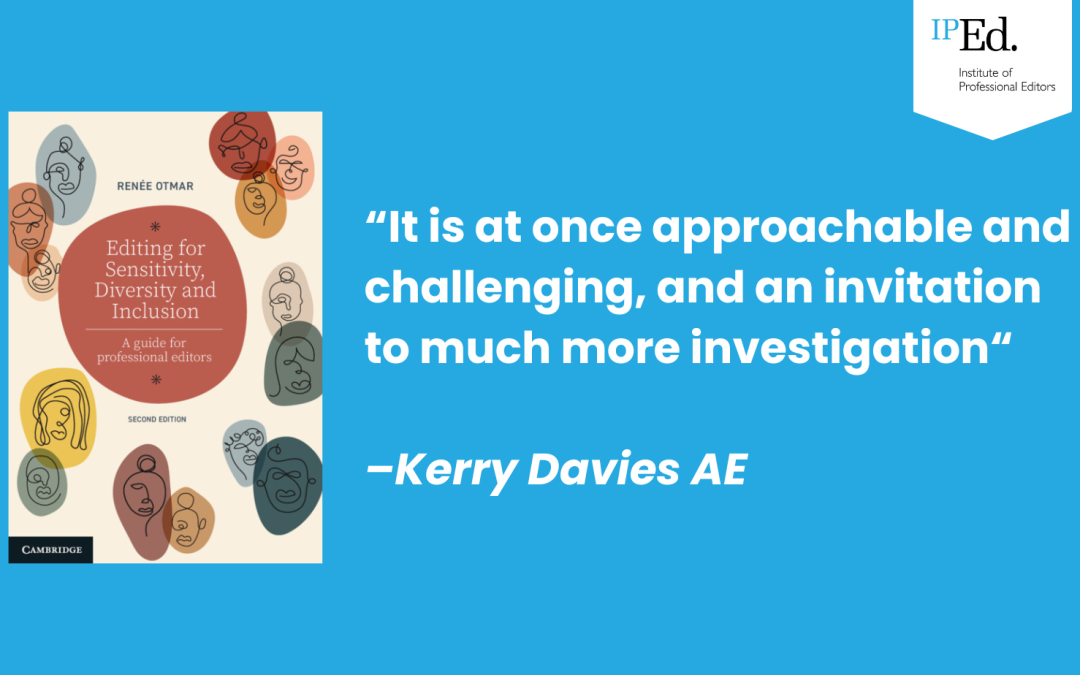By Kerry Davies AE
Renée Otmar, Editing for sensitivity, diversity and inclusion: a guide for professional editors, 2nd edition, Cambridge University Press, 2023. RRP $64.95 print copy and ebook, 340 pages.
Over recent years, editors have seen an increasing cascade of articles, blog posts, discussions, presentations, seminars and workshops about editing for sensitivity, diversity and inclusion. I’ve read or participated in many of them.
It began with a focus on sensitivity readers – and most editors understood the need for such a service from appropriate readers for manuscripts with content about specific people, groups or topics that extended beyond the author’s or editor’s own lived experience. (And some may have questioned why the author chose to include that content in the first place, but that’s another issue, albeit related.)
Then it expanded to conversations about authenticity readers and how they might differ from sensitivity readers – and there definitely can be a difference.
We then discovered that finding such sensitivity and authenticity readers (or editors), especially in Australia, was not exactly easy. Those who do this work are swamped with requests and are often unavailable, especially as a final, retrofitted stage before publication, and when authors or publishers may not have even considered the cost of that service on top of an existing edit.
That’s when a swing started. We realised that we also have a responsibility to be mindful in our editing practice of the many issues we can encounter from the authors and material we work with and, indeed, within ourselves – conscious editing, unconscious bias, literary appropriation, cultural appropriation, discriminatory language. Are we aware of current trends in language use among specific groups? What’s acceptable; what’s not? Do we understand our own biases and, if we do, can we bring that self-awareness to bear on our editing practice? It can be a complex web.
Importantly, we need to use our own personal and professional experience in our approach to this work. But not all editors have the breadth of lived experience, or even the editorial experience, to make sound judgements for all content that might land on our desk or to direct respectful enquiries to the author or publisher. We don’t know what we don’t know, as is commonly said.
In 2020 Renée Otmar self-published her guide, Editing for Sensitivity, Diversity and Inclusion. A godsend, I thought, when I purchased that first edition, both print and online versions.
This new edition, published by Cambridge University Press, has built substantially on the first. It features much more detailed discussion, new insights, new sections (including accessibility), examples and illustrations, and increased academic rigour. It now also includes perspectives for editors in Aotearoa New Zealand and editors of Māori content. Much of the content is based solidly around the United Nations’ Universal Declaration of Human Rights, other UN charters, declarations and conventions, and various national laws and policies, as well as extant research and commentary in the field.
Renée’s experience as a public health researcher and ethicist – as well as her work as a highly skilled fiction and nonfiction editor, trainer and coach – brings a unique blend of knowledge and conceptual insight to the content. It is at once approachable and challenging, and an invitation to much more investigation through the wide-ranging lists of references, many online, offered in the footnotes.
The book is in three parts – Foundations, Professional Practice and the Guide itself. Part 1, Foundations, draws on and expands the discussion from the first edition, as does Part 3, the Guide. Part 2, also drawing somewhat from the first edition, provides an invaluable model for how to approach editorial work, be it fiction or nonfiction and across all genres. Some discussions in this part I found surprising, at first. But it is here that Renée invites us, as editors, to examine our practices. How might we subtly or substantially redirect or reorder our work methods to ensure that we are, in fact, editing for sensitivity, diversity and inclusion?
This is stuff for every editor, regardless of whether we think we are editing “sensitive” material and regardless of our prior experience in this arena.
Part 3, the Guide, is usefully alphabetised by topic (from Aboriginal and Torres Strait Islander Peoples to Family status and Popular cultural references, right through to Work health and safety). Each topic has standard sections, as a quick reference – In summary, Where to start, Areas of research, practice or discussion, Common and accepted usages, Slurs and terms to avoid, Authorities and references (replacing the need for a full bibliography), and See also (cross-referencing to other topics in this part). One thought-provoking new inclusion here is Decolonising editorial practice, which is also a section in Part 2. A worthy topic for reinforcement.
This edition has a thorough index, though no glossary. Instead, definitions are included throughout, along with detailed explanation of various aspects of those terms, including their evolution and geographical use, where relevant.
One of the most refreshing aspects of Renée’s excellent book is its reference to the fact that “all of this is still so new” that contention over definitions would not be surprising “the very day after publication” (p. 118). “We live in an epoch and in global, national, regional and local societies and communities that are dynamic and in constant flux” (p. 116). At the same time, Renée recognises that “moral and ethical considerations in editing” are not new, but editors’ engagement now on access, equity, diversity and representation is “more important than ever” (p. 171).
A last note – and an important one for an editorial guide – the print-copy binding allows the pages to stay comfortably relaxed where you open them, providing ease in both cover-to-cover reading and dip-in referencing.
Highly recommended.
Kerry Davies AE is part of the working party revising IPEd’s Standards for Editing Practice for the forthcoming third edition, as well as having facilitated the 2012 revision for the second edition.

